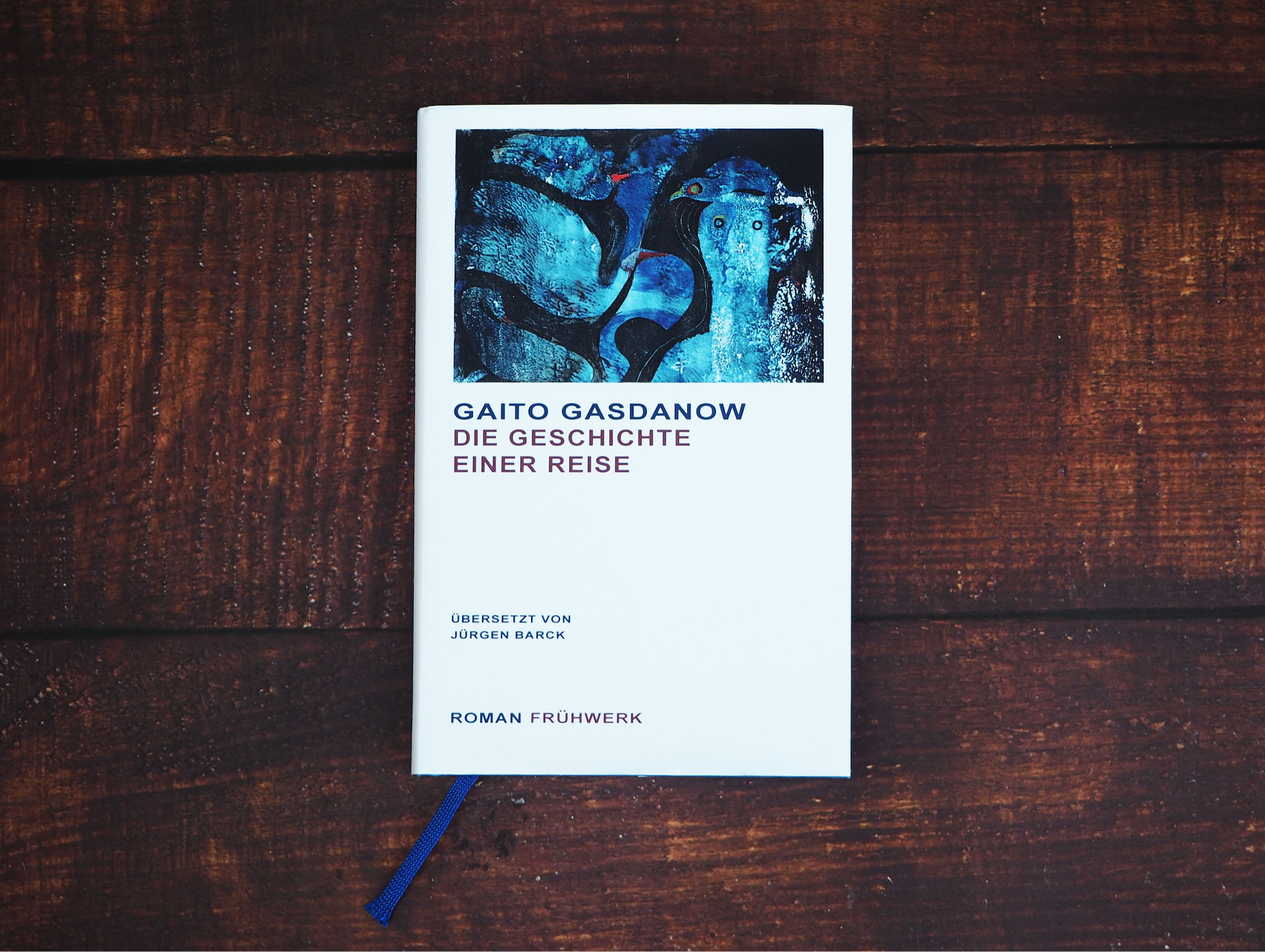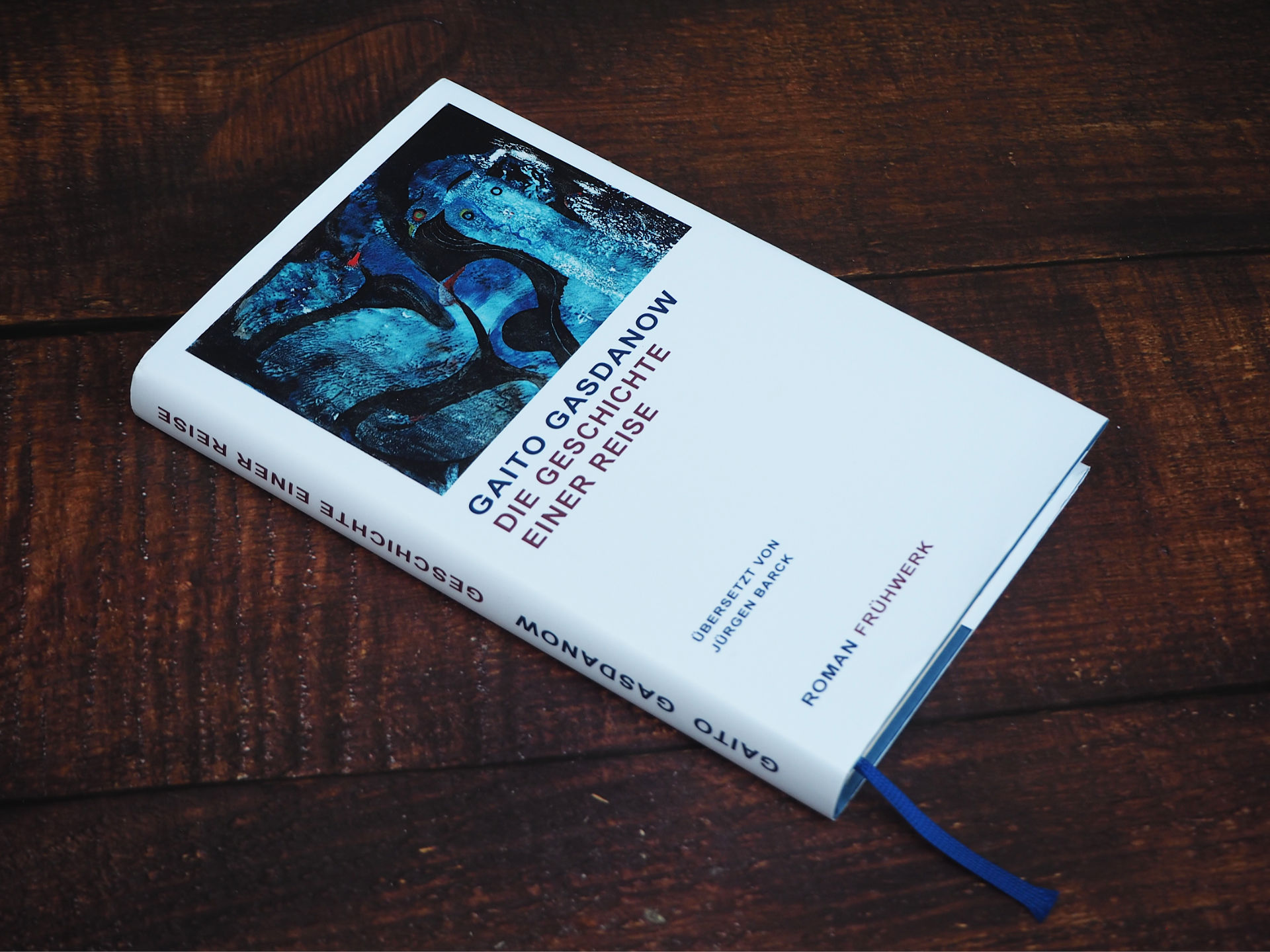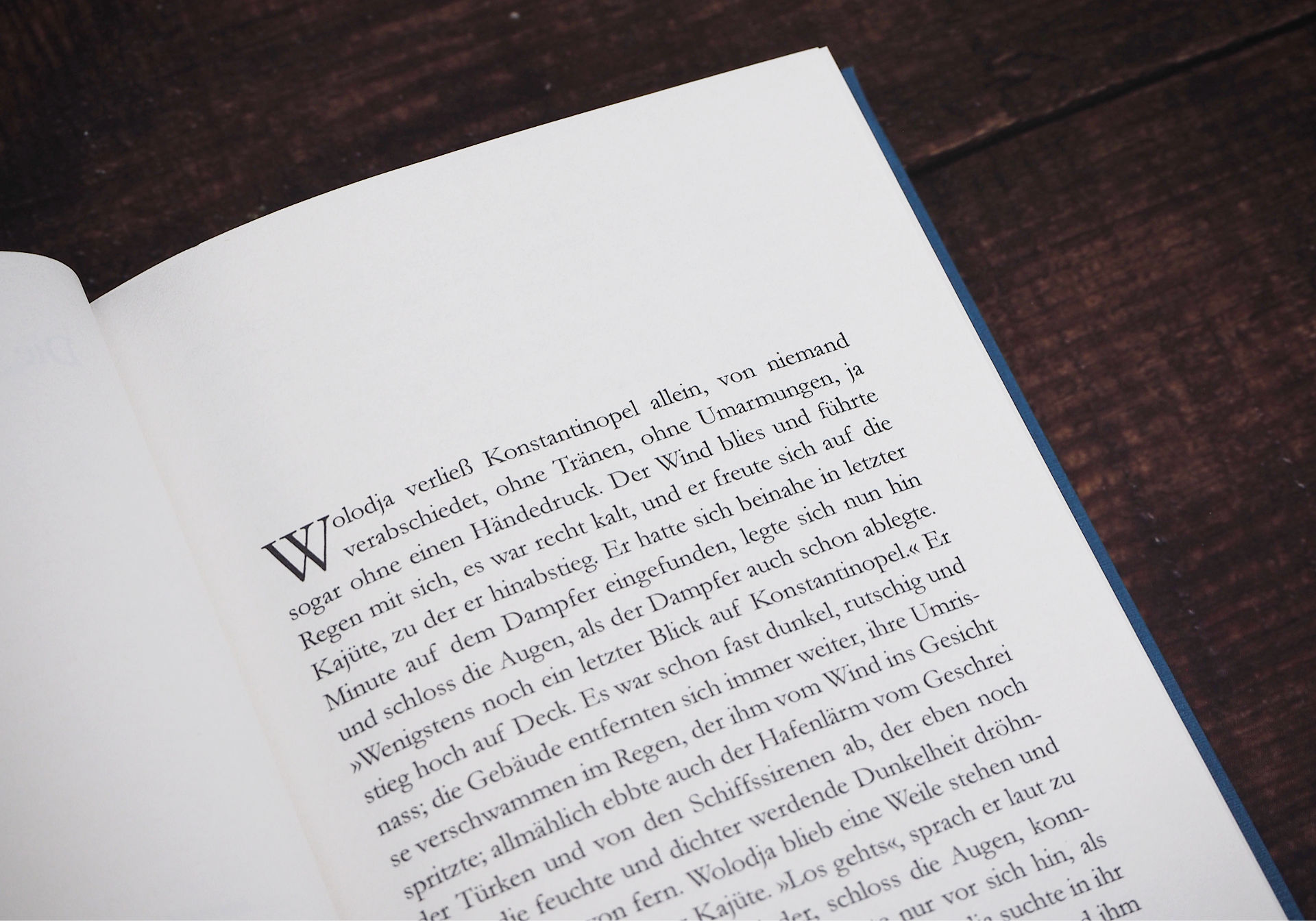Die Geschichte einer Reise • Gaito Gasdanow

Attentive readers of this blog already know that I love the books of Gaito Gasdanov and that I read each of his works the moment it appears. In 2012, Hanser set things in motion with a new translation of The Spectre of Alexander Wolf. Four more of his books followed over the years, but some of his stories were never translated into German and were therefore unfortunately inaccessible to me. Two years ago I came across The Pilgrims, which, surprisingly, did not appear from Hanser but from a Book on Demand publisher. As it turned out, the book was translated by Jürgen Barck, a translator who has been rendering Gasdanov’s forgotten works on his own initiative. I’ve already written on Lesestunden about The Pilgrims and Awakening, both books belonging to Gasdanov’s later work. Now Jürgen Barck has newly and for the first time translated The Story of a Journey into German. And because I’ve devoured and loved all of Gasdanov’s books, I don’t want to withhold this one from you either—once again, readers can expect a special pleasure.
At the center of the tale is Wolodja, a young man from Russia who travels via Constantinople to Paris. His brother lives there, takes him in, and Wolodja spends a brief stretch of his life in Paris in the 1920s. Unlike Gasdanov’s other books, however, the perspective shifts for several passages to Arthur, an Englishman, and we learn something about his love story.

I find this book genuinely hard to review because it lacks a clear line. The red thread is, of course, Wolodja—beginning with his departure from Constantinople by ship—and even in Paris it’s Wolodja’s thoughts that guide the reader through the story. Yet the narrator often digresses and, in episodic fashion, recounts the stories of various people. Readers encounter numerous secondary figures, such as the protagonist’s teacher, a Russian-born architect, or Odette, a carefree, wealthy woman. That’s simply Gasdanov’s style: not to tell one continuous plot, but to report, in fragments, episodes, and brief anecdotes, on the individuals who all form part of his protagonist’s journey. This was very pronounced already in Night Roads, and the narrative method is very similar here again.

I’ve always loved Gasdanov’s language—his sentences of great depth that so often only suggest, and with a wonderful, carefully chosen, flowing musicality draw the reader in and let one immerse in the unusual thought-world of his figures. That’s true here as well. While The Pilgrims and Awakening belong to Gasdanov’s later literary work, The Story of a Journey is, by contrast, his second novel, and you can clearly feel the difference. In Awakening, Gasdanov focused his figures on living together and their mutual relations; in his early work, however, it’s abandonment, homelessness, and disorientation that the reader strongly senses—central expressions of these stories. That’s evident again here: Wolodja is dreamy, seems to drift through Paris, meets people to observe them, and remembers his travels and past. In this, readers find Gasdanov himself, who, after the civil war, also fled Russia via Constantinople to Paris like Wolodja. Only, his own start in the city was not as gentle as in the novel but marked by privation and hard work. That this is Gasdanov’s own temperament, his thoughts that one finds in the book—his sense of having lost his moorings—one feels as a reader. The reflections are too genuine, too subjective, filled with experiences, feelings, and characteristic traits for them to be merely invented, even if they are now woven into fiction.
So what does the reader find in this novel? A highly subjective portrait of numerous figures scattered along Wolodja’s path—described from his vantage point and, in their totality, forming a complex picture of the protagonist. And a delicate picture of love and of women, fulfilled and unfulfilled, suffused with a longing that is mostly felt only faintly between the lines.
Victoria’s blooming youth reminded Wolodja at once of his grammar-school years, of Lady Hamilton, Dina, and long romantic dreams, of an entire world—of music, of women, of the slowly spreading blue waves of a distant imaginary sea. (p. 122)
The book left me with a diffuse feeling. Opening a Gasdanov always means gazing into a sublimated world of thought. The way he brings in all the senses—smells, sounds, the impressions people make by their appearance—together with the flowing language, creates a pull to which readers yield; in the end you don’t come away with one essence or single story, but with numerous impressions that echo diffusely.

The edition itself is, once again, very successful. It’s simply impressive what Jürgen Barck accomplishes single-handedly here. The translation reads very well; one immediately recognizes Gasdanov’s style, and the sentences have the familiar intonation—the distinctive idiom and effect that cling to all of Gasdanov’s books. The appendix includes notes, which are excellent, and, like the afterword, provide background information. With its ribbon bookmark, the title printed directly on the cover, and, in particular, the wonderfully chosen typography, the book is at a high publishing standard. I can only thank Jürgen Barck for translating these books—works I might otherwise never have been able to read—which have given me so many pleasant reading hours that I would hate to be without.

Conclusion: With the first German translation of The Story of a Journey, Jürgen Barck has once again made a book by Gaito Gasdanov accessible to German readers. What awaits is a narrative quintessentially Gasdanov: deep reflection, a sense of being lost, of homelessness, and of an indeterminate search that characterizes all his figures. The wonderfully subtle prose and a sensitive gaze at numerous people—assembled episodically from many fragments—offer a picture of the protagonist’s (and the author’s) inner world. That is what makes this book so very worth reading as well. The translation reads smoothly and conveys Gasdanov’s typical style, and the production is excellent. A thoroughly successful book that I raced through and can only recommend.
Book information: Die Geschichte einer Reise • Gaito Gasdanov • BoD • 188 pages • ISBN 9783754354131

Danke, Tobi, für die schöne Empfehlung. Von Gasdanow liegt mir zu Hause nur “Das Phantom des Alexander Wolf” vor; in der dtv-Ausgabe hatte ich es rein zufällig mal von einem Mängelexemplartisch mitgenommen und war dann ebenso wie Du begeistert von seinem Stil, der mich irgendwie an Franz Kafka, dem ja mit Recht die “reinste Prosa” überhaupt nachgesagt wird, erinnert hat: Unprätentiöse, schnörkellose Sätze, fließend, klar und schlüssig. Und Gasdanow vermag – ebenso wie Kafka -, für uns scheinbar Banales, Alltägliches und Gewöhnliches so aufmerksam und detailliert zu betrachten und zu beschreiben, dass wir erst durch seine Augen das Besondere, das Schöne, das Wundersame, aber auch das Absurde – sei es an einer Sache, einer Persönlichkeit oder an einer Situation – erkennen können. Und er versteht es, Emotionen wiederzugeben und dabei zu berühren, ohne uns dabei mit schwulstig-barockem Pathos zu ersticken.
In diesem Zusammenhang bin ich neulich auf eine Buchempfehlung zu der Frage gestoßen, die uns Bücherfreund:innen wohl alle bewegt: Was macht eigentlich gute Literatur aus? In Thomas Stangl/ Anne Weber: Über gute und böse Literatur, Korrespondenz über das Schreiben. Matthes & Seitz, wird dabei von Anne Weber eine interessante These aufgestellt: “Vielleicht besteht das Wagnis (…) darin, im Erzählen von Emotionen bis ans Äußerste zu gehen, also bis kurz vor den Scheidepunkt zu gehen, wo Gefühl in Sentimentalität abrutscht? Bis an die Grenze zur schlechten Literatur?”
Gaito Gasdanow kommt m.E. diesem Äußersten sehr nahe und ist jedenfalls im “Alexander Wolf” nicht ansatzweise in die Gefahr gekommen, forciert, übertrieben sentimental oder gar eigene Befindlichkeiten übersteigernd zu wirken.
Auch wenn er meinen Lieblingsautor Franz Kafka nicht erreichen kann, mag ich Gasdanows ähnlichen Stil. Und ich werde mir nun – dank Deiner Anregung – auch die anderen Werke von ihm besorgen.
Danke für deine Rezension. Auch ich habe das Buch bereits zur Hälfte zumindest durch und muss sagen, dass es auch mir schwerfällt, darüber eine Rezension zu verfassen. Schön, dass es dir gelungen ist. :)